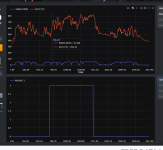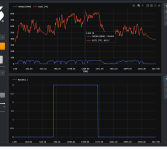So I have a burning question which I have read so much on that I am truly torn. Many forms out there seems to bash the purchasing of a diesel if you are not going to "tax" it. Stating things such as they are meant to be ran hard and they are not meant to be daily short trip drivers etc. While I fully believe that for HD trucks and trucks 10 years ago, I find it hard to believe that newer trucks with newer technology don't have a way to make this a reality.
Nonetheless, my burning question comes from a place of MPG and overall usability/longevity. I live in Wyoming where the weather can go from -'s F to +'s F in a blink of an eye. My driving averages about 8K a year (due to annual hunting trips (100-200 miles round trip). I do not have anything to tow and utilize the truck to haul things like lumber, dogs, grass and the family. I take trips down to Colorado (90 miles round trip) every once in a while, but the trips are not on a consistent basis. Travel on the daily would be 5-20 miles round trip with speeds around 40. I am torn on which truck to go with due to similar costs and functionality. As state above the forms I have read and individuals I have spoken with have given me concerns which I cannot seem to shake. Hopefully you all can help provide some clarity and guidance
Concerns:
Regens- I do not travel far and long at any given time, I worry about about the DPF filter getting clogged and the truck going into limp mode.
DEF - I worry about the truck utilizing too much DEF which would increase the overall maintenance costs.
Maintenance - Cost seems to be more than a gas truck and seems there is more to do than what I am aware.
Daily driving costs - Currently the cost between regular and diesel is .30 per gallon, however if I have to drive for an hour to get the truck to regen, is it worth it?
Cold startups - I've been told that these trucks are hard to start in the cold, but should not be plugged in unless its colder than -12F, any truth to that?
Wear and tear - With the requirement to burn off and do a Regen, how much more wear and tear will this cause to my truck?
I am sure there are more and I would love to hear everyone's thoughts on this. I am really leaning towards the Duramax, but want to make sure I am not making a 75K mistake.
Nonetheless, my burning question comes from a place of MPG and overall usability/longevity. I live in Wyoming where the weather can go from -'s F to +'s F in a blink of an eye. My driving averages about 8K a year (due to annual hunting trips (100-200 miles round trip). I do not have anything to tow and utilize the truck to haul things like lumber, dogs, grass and the family. I take trips down to Colorado (90 miles round trip) every once in a while, but the trips are not on a consistent basis. Travel on the daily would be 5-20 miles round trip with speeds around 40. I am torn on which truck to go with due to similar costs and functionality. As state above the forms I have read and individuals I have spoken with have given me concerns which I cannot seem to shake. Hopefully you all can help provide some clarity and guidance
Concerns:
Regens- I do not travel far and long at any given time, I worry about about the DPF filter getting clogged and the truck going into limp mode.
DEF - I worry about the truck utilizing too much DEF which would increase the overall maintenance costs.
Maintenance - Cost seems to be more than a gas truck and seems there is more to do than what I am aware.
Daily driving costs - Currently the cost between regular and diesel is .30 per gallon, however if I have to drive for an hour to get the truck to regen, is it worth it?
Cold startups - I've been told that these trucks are hard to start in the cold, but should not be plugged in unless its colder than -12F, any truth to that?
Wear and tear - With the requirement to burn off and do a Regen, how much more wear and tear will this cause to my truck?
I am sure there are more and I would love to hear everyone's thoughts on this. I am really leaning towards the Duramax, but want to make sure I am not making a 75K mistake.



